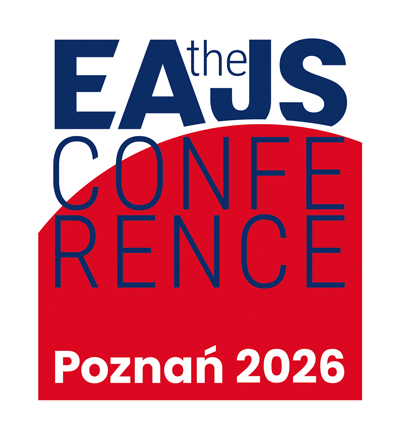
Conference
The European Association for Japanese Studies invites paper and panel proposals for the forthcoming 18th EAJS International Conference. Please read the rules and instructions below, before you submit your panel or paper.
EAJS2026 in Poznań is a hybrid conference, meaning with participants being able to take part in any panel either by being present in person or virtually. Everyone who plans to attend the conference either online or in person must register and pay fees once Early Bird registration opens (end of April 2026), with no exceptions.
Panel and paper proposals should be written in English and submitted no later than 5 January 2026.
Japanese below (日本語以下)
All panels and papers must be proposed online via a link/button below, but please read all the rules and instructions first:

Panels may be proposed with three or four pre-agreed papers within them, and preferably a designated discussant. Panel organizers should ensure that there is sufficient time for discussion.
Proposals must consist of:
You can choose between 3 different formats to propose your contribution:
N.B. panel abstracts should NOT state the names of any presenters
Those proposing panels are asked to be mindful of the inclusiveness of their membership, including rank, gender, and geographical diversity.
Keep in mind that if the panel get accepted, at least one of the panel convenors would need to be attending the conference in-person to mediate and chair the panel. Panels can not take place when both panel convenors are attending virtually/online.
After submitting the panel proposal, panel convenors will receive a confirmation containing a panel-specific link to forward to their presenters, who must then propose their papers directly into the panel before the deadline ( 5 January 2026).
Paper proposals (both individual papers and those proposed to a specific panel) must consist of:
All individual papers and papers that are pre-organised for the proposed panels must be sent in by the end of the Call for Proposals (5 January 2026).
Poster format can be proposed to AJE section. Other sections do not accept poster formats.
If proposing a poster, author must enter the abstract for the topic presented and description of the presentation/poster presentation. Posters can not be presented virtually/online, all accepted poster authors would need to attend the conference in person.
Printed A0 size posters must be brought to the conference and they will be displayed on the posterboards during the conference.
If you are not sure if your poster proposal has been received to the system, please contact AJE.
Format where usually a group of scholars (usually no more than five) discusses themes/issues of general scholarly interest in front of (and subsequently with) an audience for the duration of a single 90-minute session. While a roundtable can include short (5-10 minute) contributions, the aim is to create a lively debate rather than focus on any one presenter.
Round table proposal must consists of:
Round table convenor would need to add the round table participants as discussant on the proposal form. All round table participants are required to register and pay conference fees once the Early Bird registration starts in the end of April.
Please take a look at the Sections and when proposing your contribution, make sure to select which section your proposal would fit the best.
All presenters must be EAJS members by the time of the conference.
However, presenters do not have to be members when submitting a proposal, and membership status has no influence on the selection process.
Below you would need to click on the button to open a proposal form. If you wish to propose to Japanese Language Education (AJE) section then choose the button at your right, if you wish to propose to any other section choose the button at the left.
Contribution to other Sections
If you wish to propose to any other section than Japanese Language Education (AJE), please click the button below.
Contribution to Japanese Language Education (AJE) Section
AJE is using a separate proposal system, so if you wish to propose your contribution to AJE Section, please click the button below.
When the call ends, the section convenors will review the proposals and decide which panels and individual papers to accept. The EAJS Council is not involved in this process. Panels will be accepted in their entirety and individual papers will be grouped into sessions. The convenors can pass proposals to other sections if they believe these would fit better there.
The review process consists of two stages:
The Program Committee (consisting of members of the EAJS Council) takes a final look at the selection to consider thematic overlaps between the sections.
Applicants will be informed of the selection results by the 15th March 2026. The section convenors are not required to give any feedback or justification for their decisions.
The EAJS has applied to the Toshiba International Foundation for funds to support delegate attendance in the EAJS conference in 2026. The Call for Applications outlining eligibility criteria and application rules will be published soon.
The Call for Funding will open on 2 April 2026. All applications must be submitted via an online form, not by email. Selection results will be announced on the 28 May 2026.
In addition to meeting the application criteria, the awarding of a conference grant will be contingent on the approval of the funds requested for this purpose.
「第18回EAJS国際会議 発表・パネル提案募集」
パネルおよび発表要旨は英語で作成し、2026年1月5日までにご提出ください。
(注)日本語教育セクションは独自の提出期限を設けています。AJEの要旨提出サイトをご参照下さい。

すべてのパネルおよび個人発表の提案は、以下のリンク/ボタンからオンラインでご提出ください。
ただし、提出前に必ず以下の規定および注意事項をお読みください。
それ以外の重複は認められません。
要旨提案者は、審査の匿名性を確保するために、各セクションのコンビナーへの直接の連絡を控えてください。
各セクションのコンビナーは、選考プロセスが完了するまで、個別の問い合わせへ対応しません。
要旨の提出方法やシステムに関するご質問は、下記のメールアドレスまでお問い合わせください。
eajs(at)nomadit.co.uk
発表は、以下の3つの形式からお選びいただけます。
パネルは、あらかじめ合意された3〜4人の発表者で構成することができます。可能であれば、討論者も指名して構いません。
コンビナーは、十分なディスカッションの時間を確保するよう心がけてください。
1パネルの持ち時間は90分です。目安として、1発表あたり約20分(発表15分+質疑応答5分)です。
パネル要旨を提出すると、自動的に確認メールがコンビナー宛に送信されます。
メール内には、パネル内の発表者に送付するための専用リンクが記載されています。コンビナー以外の発表者はこのリンクから、自身の発表要旨を登録してください。
要旨は各セクションに提出され、審査の過程でテーマが他セクションの趣旨により適していると判断された場合、他のセクションへの移動提案がなされる場合があります。
パネル発表には、以下の項目を含めてください。:
※ パネル要旨には、発表者の氏名を記載しないでください。
パネルにあたっては、メンバー構成の多様性(職位、ジェンダー、地域的多様性など)にもご留意ください。
パネルが採択された場合、少なくとも1人のパネル責任者が現地で会議に出席し、パネルの進行役および議長を務める必要があることに留意してください。両パネル責任者がオンラインで参加している場合、パネルは開催できません。
パネル要旨の提出後パネル責任者には確認メールが送信され、そこに各発表者へ転送するための専用リンクが記載されています。発表者は、2026年1月5日までにそのリンクから自身の発表を直接登録してください。
(注)日本教育セクションは独自の提出期限を設けています。AJEの要旨提出サイトをご参照下さい。
個人発表およびパネル内の発表提案は、以下の情報をご提出ください。:
すべての個人発表およびパネル内発表の提案は、2026年1月5日までに提出を完了してください。
(注)日本語教育セクションは独自の提出期限を設けています。AJEの要旨提出サイトをご参照ください。
ポスター形式はAJEセクションのみ行われます。他のセクションではポスター形式を受け付けておりません。
ポスター発表を希望される場合は、発表テーマの要旨および発表内容の概要をAJEの申し込みサイトに入力してください。
A0サイズの印刷ポスターを会場にご持参のうえ、会期中に指定のポスターボードに掲示してください。
ポスター提案がシステムに受理されたか不明な場合は、AJEまでお問い合わせください。
通常、5名以下の研究者グループが、90分間のセッションを通じて、聴衆の前で(そしてその後聴衆と共に)学術的に広く関心のあるテーマや問題について議論する形式です。ラウンドテーブルでは短い(5~10分)発言も含まれることがあるが、特定の発表者に焦点を当てるよりも、活発な議論を生み出すことが目的です。
ラウンドテーブルの要旨に以下の情報を含めて提出してください:
ラウンドテーブルのコンビナーは、要旨にラウンドテーブルの参加者全員を討論者として登録してください。4月末に早期登録が開始され次第、ラウンドテーブルの参加者全員は登録手続きを行い、会議参加費を支払う必要があります。
ご提案にあたっては、以下のセクション一覧をご参照のうえ、最も適したセクションを選択してください。
すべての発表者は、会議開催時までにEAJS会員、もしくはAJE正会員であることが必要です。
ただし、要旨を提出する段階では会員である必要はありません。会員資格の有無は、選考結果に一切影響しません。
以下のボタンをクリックすると要旨提出フォームが表示されます。日本語教育(AJE)部門への投稿をご希望の場合は右側のボタンを、その他の部門への投稿をご希望の場合は左側のボタンを選択してください。
他セクションへの提案
日本語教育(AJE)セクション以外のセクションへ提案を行う場合は、下記のボタンをクリックしてください。
日本語教育(AJE)セクションへの提案
AJEセクションでは、独自の提案受付システムを採用しています。AJEセクションに要旨提出を行う場合は、下記のボタンをクリックしてください。